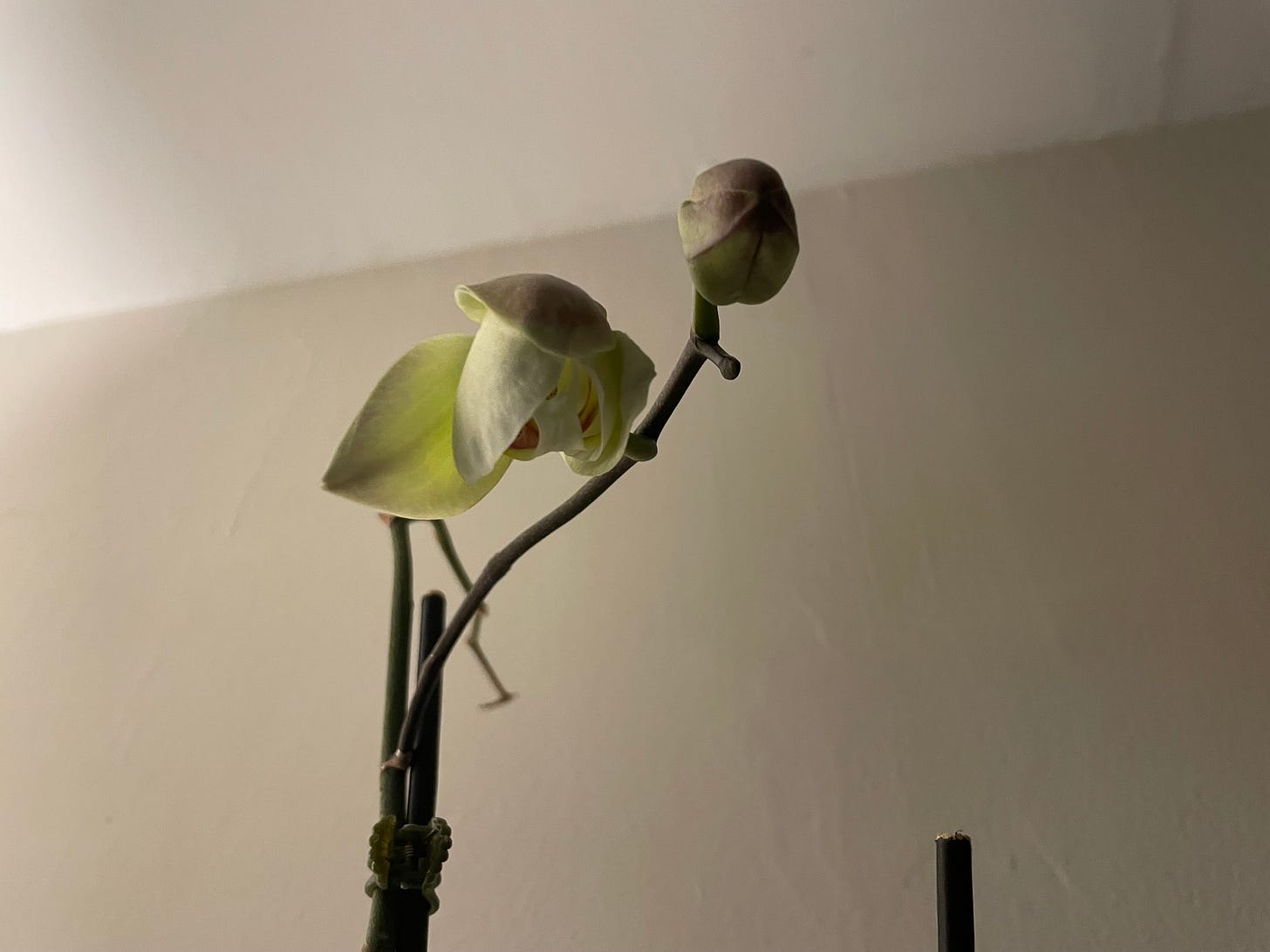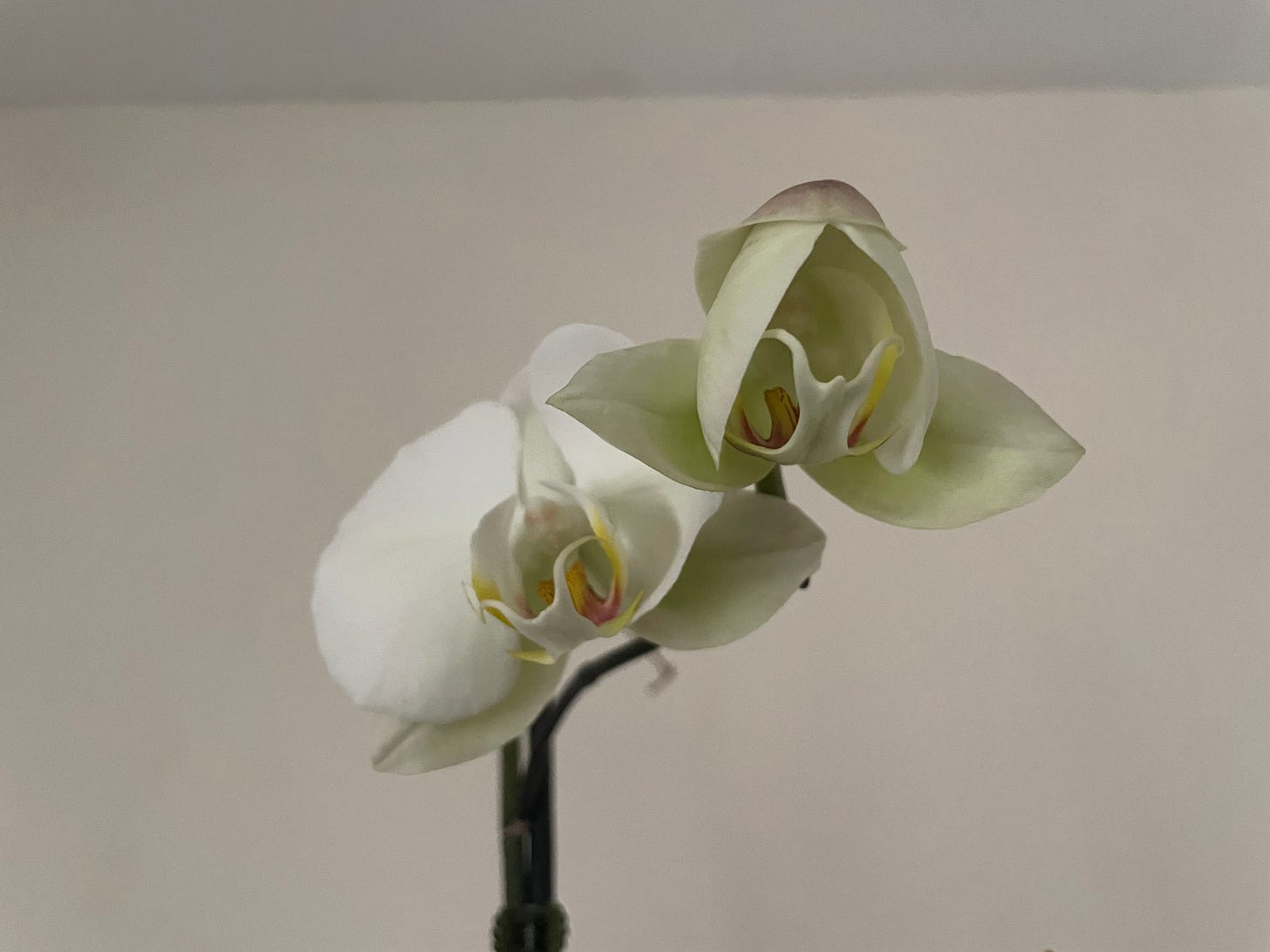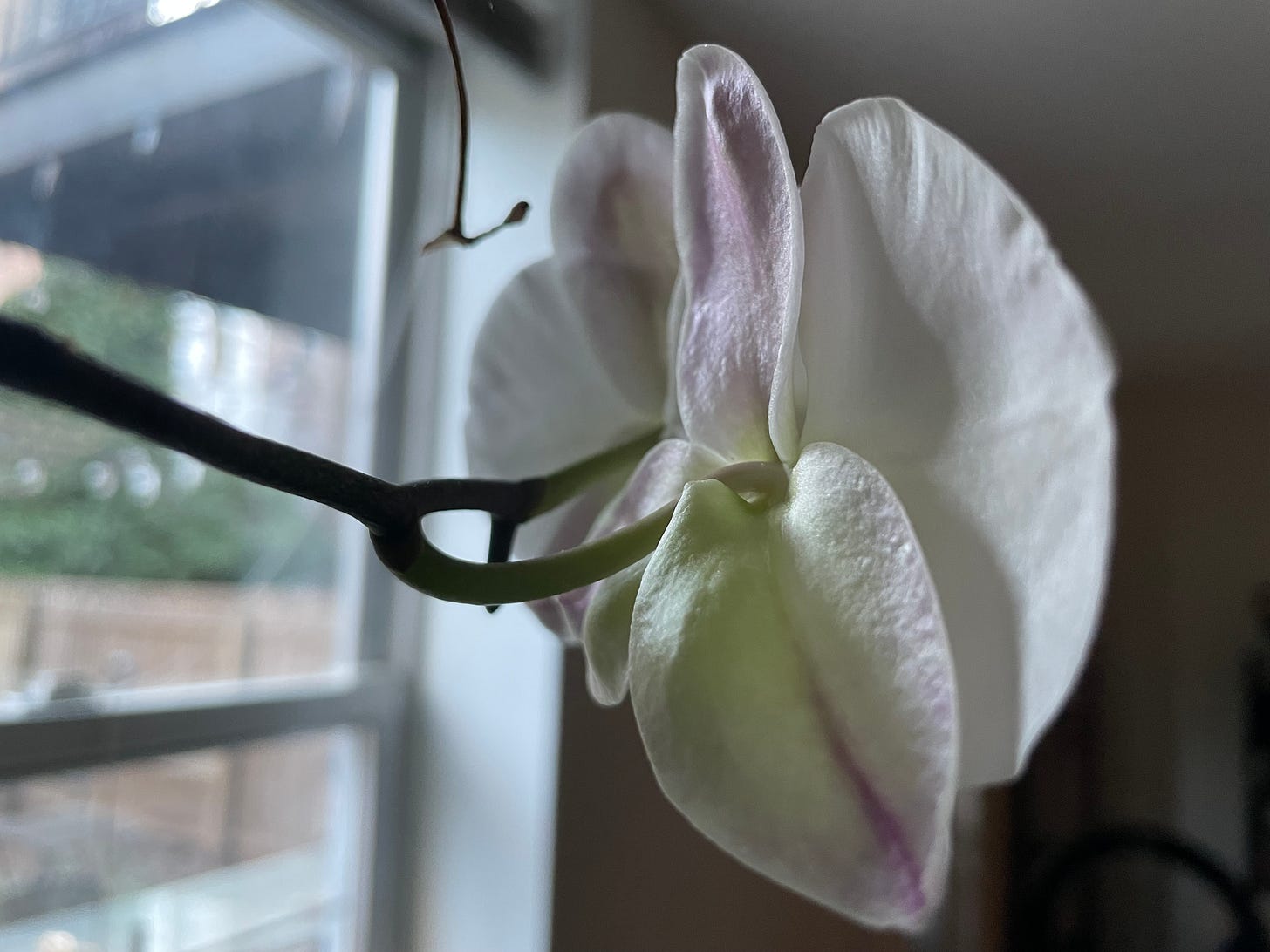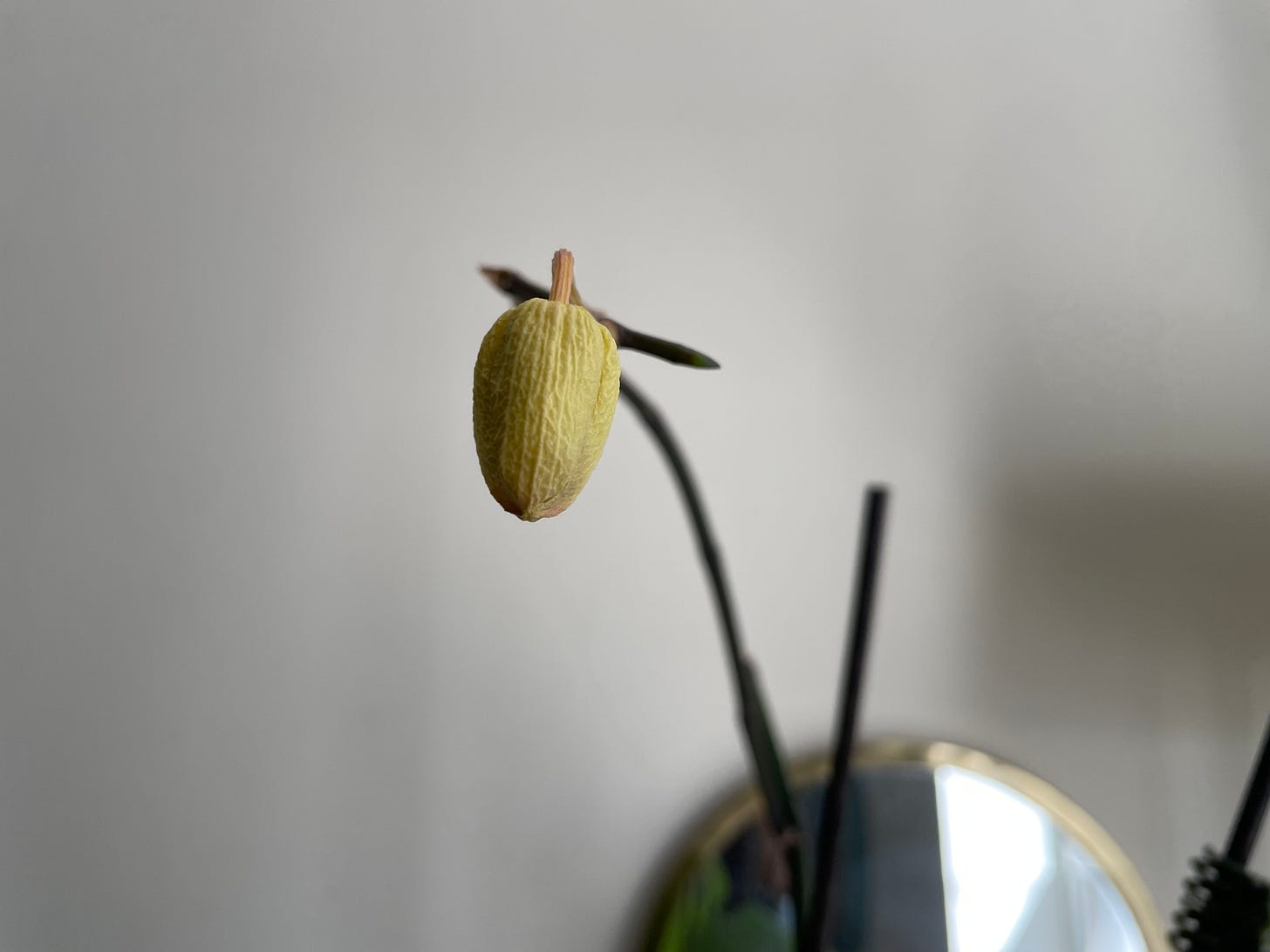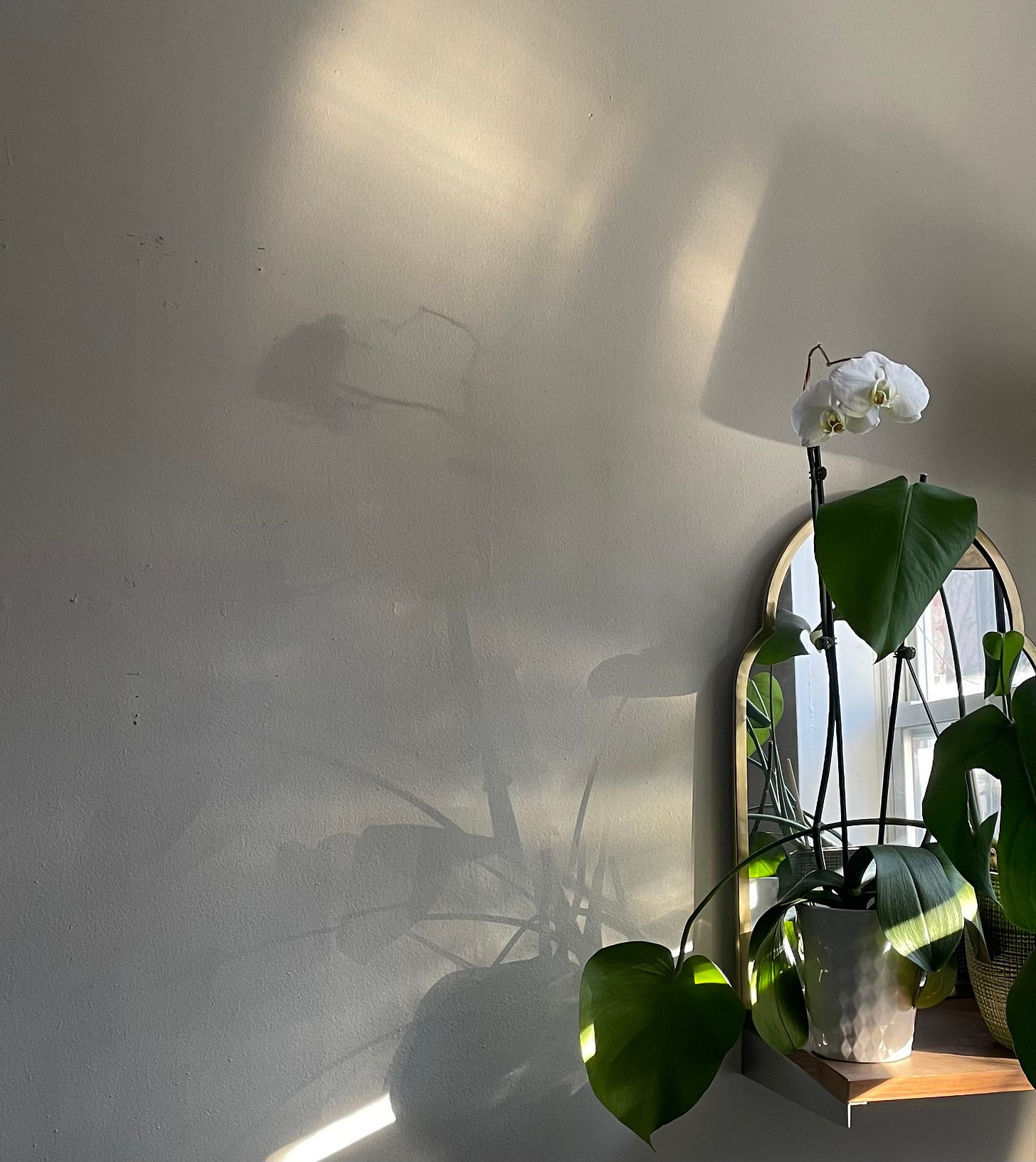A tale of two orchids
Control is an illusion, but that doesn't mean our efforts aren't worth it
When I was trying to come up with names for my financial coaching business, I threw around many, many “meh” ideas. Not awful but not quite right. Some were decent enough to sit on for a few days. And one of those decent names was “Orchid Financial Coaching.”
Orchids are famously intimidating plants to maintain. They’re in bloom and then they lose their petals and that’s usually when people think that they’ve failed and throw them away.
A friend gifted me an orchid a couple years ago and when they lost their flowers I was ready to quickly give up on the bleak stems that remained.
But then I decided to text my sister-in-law.
She’s a very busy person who has managed to make a hobby of growing orchids. Knowing someone who wasn’t a pro-florist made the prospect of doing it myself more possible in my mind.
She taught me that when they look dead, they’re not dead. They’ll lose their petals, yes, but you can get them to bloom again with the right care and a lot of patience.
Orchids, she told me, need indirect sunlight and just a bit of water (about an ice cube amount, though not a literal ice cube) about once a week. Finally, she told me to watch their leaves, not their petals, for signs of health. The leaves should be buoyant at the root and not so wrinkled or droopy.
It was with these few tidbits of basic knowledge that I was actually able to properly tend to my orchid and bring it to bloom again months later.
It was such a rush, after watching it just sort of sit there, looking quite “dead” for months on end, to see its first buds, then first blooms, finally appear.
The other orchid
I maintained two orchid plants this year. I gave them the same amount of attention (I think!) and both produced pregnant little buds, two on one plant, three on the other. But as I watched the one with two buds thrive and bloom (see above), I watched the other lose each of its three buds, one by one.
What did I do wrong? I check on all of my plants every few days, so it certainly seemed like they were getting the same level of care.
Regardless, it seemed like some environmental factors beyond my control were killing this bloom no matter how much attention I paid to it.
The same is true of our finances. We can do all of the right things and sometimes we can see the fruits of our labor — a paid-in-advance vacation, a car paid for in cash, an emergency fund goal reached.
Other times something in our environment foils our plans. Maybe it’s a surprise surgery, an expensive problem with our car or house, or even a recession.
We cannot beat ourselves up when an environmental hurdle jacks up our best laid plans. Bad things just happen. We were fated to live in these precise circumstances at these precise times. (And to my church kids out there: God doesn’t hate you if he didn’t hate Job).
And…
Just because the latter scenario is true doesn’t mean it’s not worth it to try.
Throwing up our hands, closing our eyes and crossing our fingers that we somehow get rich quick one day not only brings us a ton of ambiguous stress but keeps us from trying the few things that can bring some proverbial orchid blooms. If we never try to do this “hard” thing we can never know what’s possible for ourselves.
We create the conditions for our financial well-being, even if we don’t fully control them. Orchids taught me to pay attention to my inputs — my efforts and intentions — rather than judging myself based on what comes of those efforts. When things don’t go our way, we can say we did what we can.
When they do? We enjoy the view.
ETC.
“You are afraid of surrender because you don’t want to lose control. But you never had control; all you had was anxiety." - Elizabeth Gilbert
A breakdown of common tax documents (not a thrilling watch, but a bp-reducing one)
Affordable Necessities vs. Luxuries - Freddie Smith
New Money, by Tressie McMillan Cottom
Good Bones Financial Coaching News
Ok, I’m still getting used to being my own marketing department here.
I’ve got openings in April, May and June for my 6-session coaching program, The Good Bones Edit. Here are a few kind things clients have said about it so far (sharing with permission):
"I've already recommended it to several friends! I have said that Bethel is non-judgmental, understanding, and meets you where you're at. Everything she offers (exercises, prompts, spreadsheet tools, etc.) is manageable, adaptable, and lets you actually visualize your money, goals, and priorities. I have felt both supported and empowered throughout this process and, for the first time ever, confident about money!" - Isabel
"It has helped me tremendously by giving me the space to feel my feelings (surprise, money has a lot of feelings underneath it!) and work through them so I can actually confront my financial issues and create a pathway towards my goals." - Lily
"Bethel is gentle, insightful, and deeply empathetic. I wouldn't hesitate to recommend her program to anyone seeking guidance about money." -Meredith
I have really, really loved doing this work. I love seeing my previously money-avoidant clients gain clarity over their finances and make meaningful, if incremental, steps toward their dreams.
You can schedule a free 30-minute session with me here to see if The Good Bones Edit is a good fit for you.
Thanks for reading! More soon.
Bethel




